All images courtesy of Glass Onyon PR
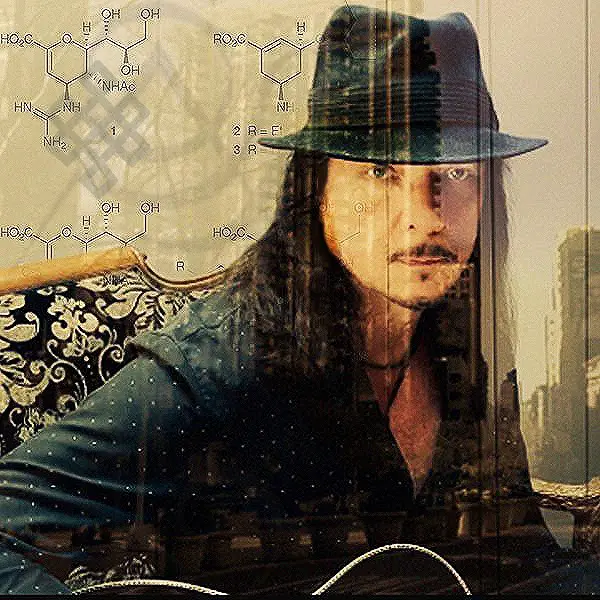
Veteran bassist, Chuck Wright’s career dates back to the 70s, with his trendsetting Progressive Rock outfit, Satyr. Gleaning all the knowledge he could from his early Progressive, and Fusion leanings, Chuck cut his teeth on the circuit, and eventually found himself in a position to join burgeoning Heavy Metal outfit, Quiet Riot, as they were recording their seminal 80s smash record, Metal Health.
As the decade wore on, Chuck proved himself a versatile player, as he provided his songsmith to bands such as Giuffria, and House Of Lords, and in doing so, endeared himself to fans across the world while engraining himself deeply within the roots of Hard Rock and Heavy Metal.
I recently had the opportunity to catch up with Chuck, and dig into, among other things, his new solo record, Chuck Wright’s Sheltering Sky, his career in, and out of Quiet Riot, what he using gear-wise these days, and a whole lot more.
If you would like to learn more about Chuck Wright, or his new solo record, Chuck Wright’s Sheltering Sky, head over to Chuck’s webpage, and dig in. Once you’ve done that, check out this interview with Chuck. Cheers.
Andrew:
Chuck, I appreciate you taking the time today. How have you been holding up over the last year or so? What have you been up to?
Chuck:
All things considered, I’ve been doing well. I have been on the road the past 18 months with Quiet Riot, mainly doing weekend fly dates. While home, I’ve been focused on my first ever solo album, Chuck Wright’s Sheltering Sky. When the pandemic hit, and we were asked to stay home, I thought to myself, “What better time than now to start composing again.” I had no agenda. I just wanted to create music I’d want to listen to myself. Many don’t know that I was a co-writer on every song on Quiet Riots Q3. With my band, House Of Lords, I was the majority writer on the debut, and a significant contributor on the 2nd album, Sahara. I’ve been a writer on quite a few albums I have out there. It felt good to be composing again. I also taught myself video editing. I’ve been a graphic designer since the early 90’s working for a few record labels, so, it was an easy transition for me.
Andrew:
Before we dive into your professional career, let’s go back a bit. What first got you hooked on music?
Chuck:
I remember my sister coming home with The Beatle‘s “I Wanna Hold Your Hand” single. That opened my eyes to Rock ‘N’ Roll. I’d get up on the fireplace, as a 6-year-old, with a Tennis racquet as my guitar, and imagine all the little shags in the carpet being people. In a way, that vision came true, having played huge events like Rocklahoma with 100,000 people there…the shags.
Andrew:
As a bassist, who were some of your early influences?
Chuck:
Oddly enough, their names all start with the letter “J.” John Paul Jones, Jack Bruce, John Entwhistle, James Jamerson, Jaco Pastorious, Jeff Berlin, and James Paul McCartney.
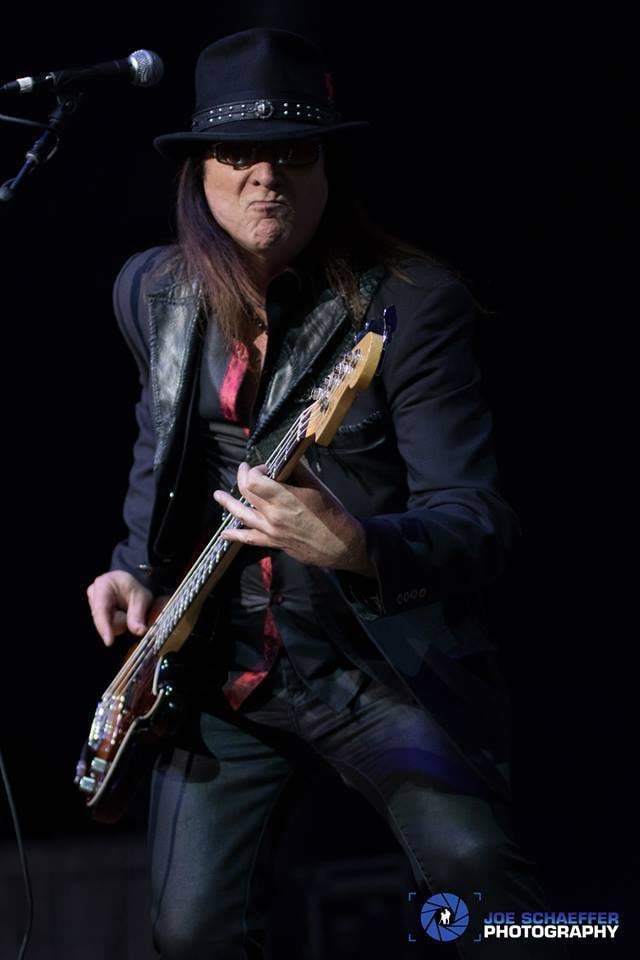
Andrew:
Let’s talk about recent events. Take me through the recording of your new solo record, Chuck Wright’s Sheltering Sky. What led to you finally putting out a solo record after all these years?
Chuck:
As I was saying, being stuck at home due to the COVID Pandemic, I decided to pick up my acoustic guitar, something I haven’t done in forever, to just create music from what I had been feeling about this crisis. I started accumulating a lot of solid song ideas and reached out to musician friends of mine to see what they thought. Well, they asked to play on the song, which was very validating. Later, during the unrest of 2020, I was inspired to finish my version of “Army Of Me,” which is now my debut single, and video.
You can see that here.
I was searching for a song file and found the basic track that I had recorded years back with my friends, Lanny Cordola, and the late Pat Torpey of Mr. Big. In Bjork s lyrics, the original song, and lyrics, which were about her brother, telling him to get his act together. For me, this song, and video represent telling the world to get their act together. The visuals in the song’s video include 3D animation created by my friend, Drew Lanius, of an “army” of Ruth Bader Ginsburg, the late Supreme Court Justice. I chose to recognize the late Justice in the video as she was such a formidable presence, and inspired an army of believers.
Andrew:
You’ve got an amazing cast of players on this record, with appearances from members of Mr. Big, Skid Row, Tesla, Dream Theater, Asia, and more. It seems you’ve pulled out all the stops. Tell us more.
Chuck:
I’ve been kicking around a long time; I started touring in 1985, and have hundreds of musician friends through touring, and through my weekly event, “Ultimate Jam Night,” at the legendary Whisky A Go-Go since 2015, and bringing together 45 to 100 musicians a show. So, many new relationships have formed, bands created, musicians getting hired by being seen at my event. I discovered the ultra-talented vocalist Whitney Tai this way. She sang on three of my songs and co-wrote with me. “Ultimate Jam Night” is on hiatus right now, because of the pandemic, but I am hopeful we will return in January 2022. To learn more about the event, go to ultimatejamnight.com.
The key here for this album is that I have the right player for the right song and part. One example is, I have four guitar players on one track — a Lap Steel player, Pedal Steel player, electric slide player, and a regular Rock style guitar. It seemed a natural thing to include many of my friends in my vision. I’m playing acoustic guitar on a good majority of the songs, some keyboards, and of course, different basses, be it fretless bass, eight-string bass, or my four-string basses.

Andrew:
This record runs the proverbial gamut of genres with tracks ranging from Jazz Fusion to Prog, to Funk, to the Rock we all know you to be associated with. As I’ve alluded to, you’re primarily known as a Hard Rock, and Metal guy. That said, what led you to step out of your comfort zone, so to speak?
Chuck:
I suppose most people would expect a “Classic Rock” stylized record from me because of my years with Quiet Riot, but those fans out there that know my body of work having co-produced two Reggae albums, an Ambient Trance album, my very eclectic band projects Magdalen, Odd Man Out, and Chaos Is The Poetry, and others, will know this album will be very different and diverse. My roots are in Prog. I had one of the top drawing bands in Los Angeles in the late 70s called Satyr.
Andrew:
Let’s go back now and talk about Quiet Riot. You joined the band during the recording of Metal Health, and play bass on the legendary track “Metal Health,” which has a killer bassline, as well as “Don’t Wanna Let You Go.” Take me through your induction into the band.
Chuck:
The band I just mentioned, Satyr, was a kind of Progressive Rock mixed with a Led Zeppelin, and Queen sound, but with lots of keyboards. We were the first band ever to use Krypton Lasers, because we had a friend developing the technology at the Jet Propulsion Laboratories, in Pasadena. We also had costume changes, elaborate staging, and even a comic book for the song lyrics. The keyboard player, Pat Regan, went on to produce KISS, Deep Purple, Mr. Big, and many others. The drummer, Richie Onori, is in the Sweet. Our guitar player back then, Bob Stephen, was asked to join the band DuBrow, and later when Rudy Sarzo left DuBrow to join Ozzy, they asked me to come on board. We did the demos that became the hit release, “Metal Health,” when they changed the name to Quiet Riot. We only used that name again because the label president gave us two options, “Wild Oscar,” and “Standing Hampton.” Kevin said, “Forget that. Let’s use Quiet Riot again.”
Andrew:
Over the years, you were in and out of Quiet Riot, with both you and Rudy Sarzo seemingly unintentionally alternating bass duties. What led to you sort of weaving in and out of the band?
Chuck:
I guess it’s all about perception. Though I’ve spent 21 years of my life, written songs, and recorded 9 albums with Quiet Riot, he is still perceived as the bass player. There was a documentary that was on Showtime for 2 years that tells the full story. It’s called. The Quiet Riot Movie: Well Now You’re Here, There’s No Way Back.
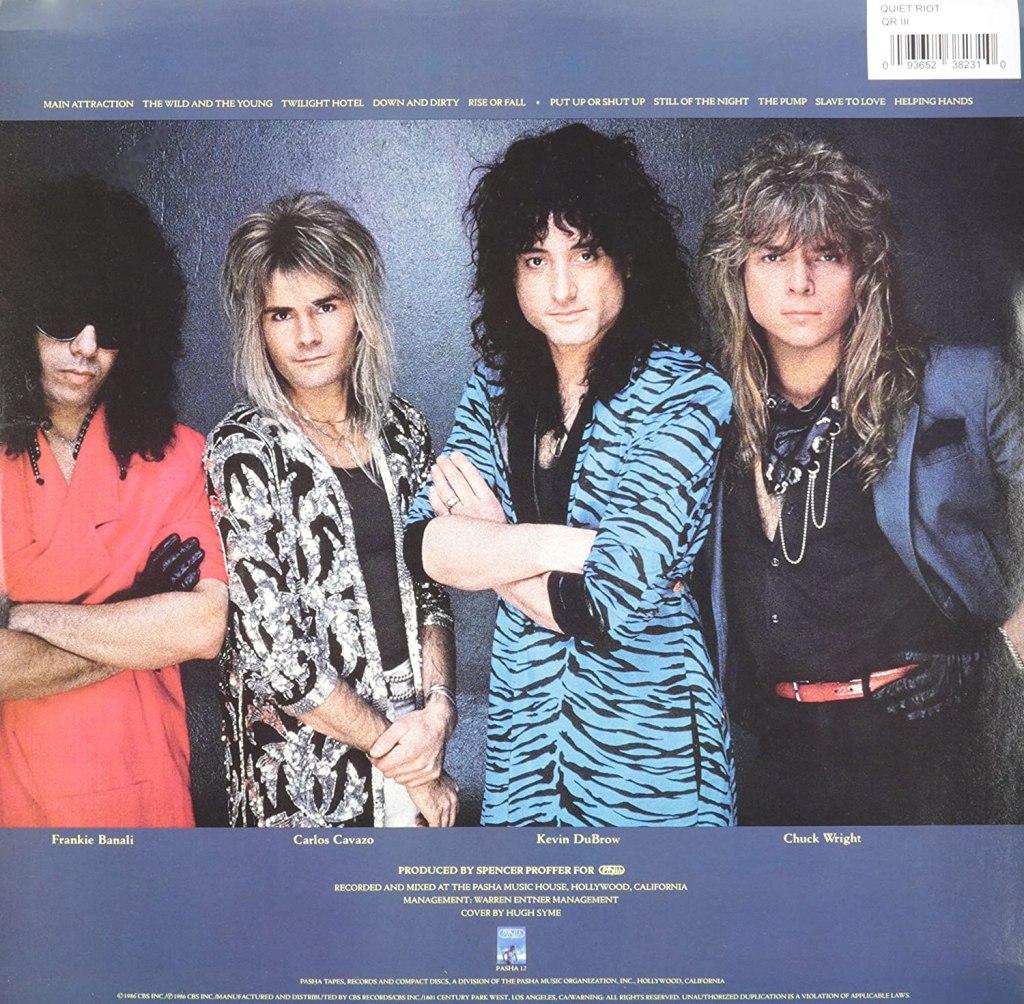
Andrew:
Another fantastic band you were a part of was Giuffria, which also led to you joining House of Lords. Take me through your induction, and membership to those bands.
Chuck:
I put House Of Lords together with Gregg Giuffria. He called me and said he could get a deal with Gene Simmons’ (KISS) new custom label if we put together a killer band. We saw Ken Mary playing drums with Alice Cooper, and were so blown away we reached out to him, and he joined up. Lanny Cordola, now a lifelong friend and also appears on my solo album, was on the 2nd Giuffria album and joined up as well. We had some great songs recorded and written with David Glen Eisley (singer of Giuffria), but Gene didn’t want us to be another Giuffria band, so I brought in James Christian to sing lead whom I was working with on a project called “Eyes.”
Andrew:
More on House of Lords now. The band’s debut record, House of Lords, is an underrated Glam Rock/Hair Metal showcase. What do you recall about the recording, and reception of that record?
Chuck:
I’ve always thought that we would have done much better if House Of Lords had been on a Rock music record label like Geffen. Gene’s label deal was through RCA, which was basically a Country music label then. Breaking a new Rock band seemed beyond them. Recording-wise, we knocked that album out top to bottom in 30 days with the late legendary Andy Johns engineering and producing. He’d worked with Led Zeppelin, The Rolling Stones, and many other iconic artists. Andy had so many interesting stories. That was a great band live!
Andrew:
After the recording of House of Lords’ second record, Sahara, and the touring cycle which seemed to end in 1991, you left the band. Ultimately, what led to that decision?
Chuck:
Basically, there were some unfortunate business dealings that took place with management.
Andrew:
As is the case with Quiet Riot, you’ve been in and out of House of Lords as well. Your last record with the band was 2004’s, The Power and The Myth. Any chance we see you working with the band again in the future?
Chuck:
We decided to get together and create some new music when asked by a label, but Gregg really wasn’t playing anymore. Because of the situation with the record label at that time, we didn’t get to finish The Power and The Myth the way we’d hoped. We kind of ran out of time. We did go over to Europe to do a couple of concerts. The show in Nottingham, England, was recorded. There’s an album called Live In The UK. I also did the CD package design. and art for that one. and The Power and The Myth.

Andrew:
The death of Kevin DuBrow was a harrowing loss to the Rock and Metal communities. What can you tell us about working with him over the years? How important and influential was Kevin to the 1980s movement of Hard Rock, and Heavy Metal music?
Chuck:
They broke the mold when Kevin passed. He was one of a kind. Outspoken, opinionated, and so funny…oh and loud too, no matter what he was doing. He had a powerful growly Steve Marriot-type voice. What can you say? Had it not been for Quiet Riot doing “Cum On Feel The Noize,” there might not have ever been a Metal scene. The funny thing is, Kevin didn’t want to do that song. I sat in the studio with the producer, arguing with Kevin that we needed something that sounded like a commercial CHR hit, and we just didn’t have that. He finally caved in.
Andrew:
The 1990s was a volatile time for 70s and 80s rockers. This said, in your opinion, did Grunge have as much of an effect as it’s perceived to have had on Heavy Metal? Even if it did sort of “kill Metal” for a time — were you a grunge fan? What are your thoughts on countless mainstream acts such as KISS, Mötley Crüe, and more “going Grunge” in the 90s?
The 90s musically is kind of a blur to me. I got into doing records with Lanny Cordola in the Christian market in those days. We covered so many different styles, which was very rewarding. I did do a couple of years of road work with Quiet Riot, but they were playing smaller clubs, and state fairs in those days. It was pretty ugly going for all 80s bands. I believe the combination of Nirvana’s success, and MTV’s Bevis and Butthead slamming 80s Rockers is what killed off 80s Rock.
Andrew:
One last notable record from the 90s you were a part of that I wanted to touch on was Doro’s 1990 record, Doro, which you play bass on. This was a very cool record, which featured Tommy Thayer on guitar, and Gene Simmons as producer. Take me through how you ended up working with Doro, and what the experience of recording that record was like.
Chuck:
I’m on a few tracks on that, but they don’t break down who’s on what in the credits. Gene Simmons asked me to come in, and record. Doro was sweet, and such a force as a singer. My dear friend, Pat Regan was producing.

Andrew:
Much is made of the 1980s golden age of Hair Metal and Glam Rock. Looking back, was it really as crazy as it seemed? What was your experience like?
Chuck:
Everything you’ve heard is true; just multiply that by a 100-fold. Crazy is an understatement. Like the Quiet Riot song goes, we were “The Wild and The Young.”
Andrew:
Easy ones now. What are a few of your favorite albums, and why?
Chuck:
I like most styles of music, everything from Sting, to ACϟDC, to Led Zeppelin, to Beethoven, to The Beatles, to Jazz Fusion, like Weather Report, and old Prog bands like Yes, and King Crimson. I’m not into Rap, although I did do a heavy-handed Rap record with Sen Dog from Cypress Hill called SX 10. I was also in a Flamenco band for a couple of years, and I love Latin music. Each genre offers its own magic for me. I can’t pin them all down to a “why” exactly. If it is done well and moves me, I’m into it!
Andrew:
What other passions do you have? How do those passions inform your music, if at all?
Chuck:
One of my passions is creating cinematic content, and I plan to start a music video/film company with my genius friend, that has won many awards as a cinematographer, editor. He scores movies and is an excellent engineer. We did a video recently for a young girl Rock band, and within a week, they got picked up by Gene Simmons company based on the video. I also enjoy graphic designing, and I got into video editing for the last 18 months.
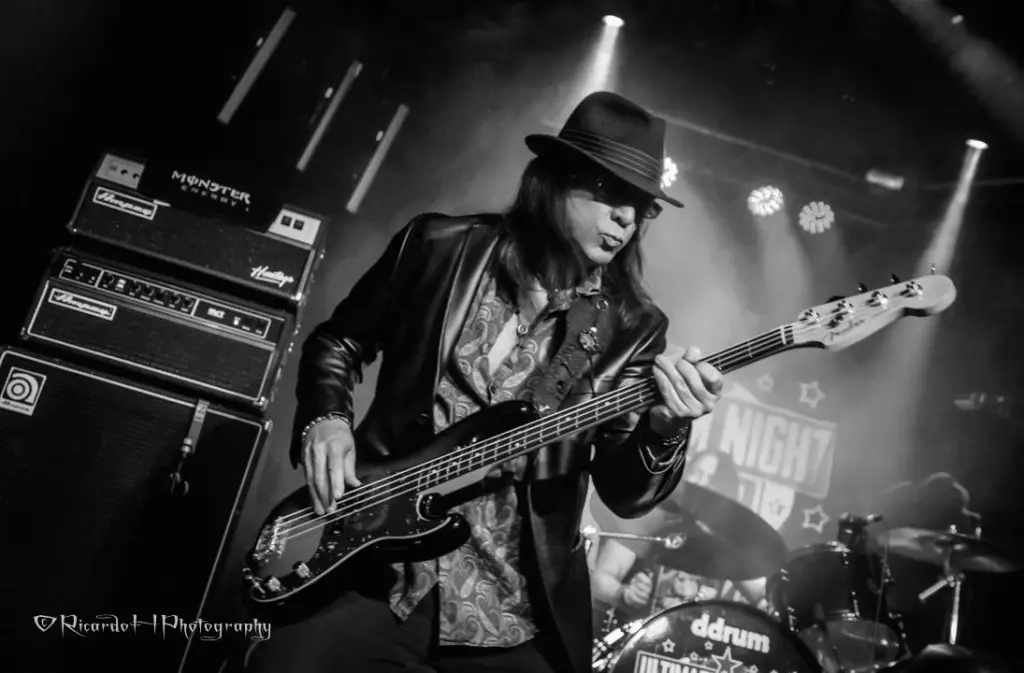
Andrew:
What sort of equipment do you use in the studio, and the live setting?
Chuck:
I always bring a Bass that works best for the track. I recently did a session for two different acts. One was like the band Ghost. So, I used my 1985 Spector NS-2, which is an aggressive Bass tonally. The other was a Country artist, so, I used my Fender P-Bass. In a live setting, I take one of my Fender Basses since they travel well. The backline is usually two Ampeg SVT Classic heads, and two 8 by 10 speaker cabs. I’ve been endorsed by Ampeg since the 80s. There’s nothing more Rock ‘N’ Roll than a Fender P-Bass and Ampeg.
Andrew:
Last one. What’s next for you as we move forward? Do you plan to hit the road, and tour this new solo record you’ve got out?
Chuck:
Right now, I’m considering doing a one-off show to film for a DVD featuring a lot of the players on the album. We’ll see how that goes, then decide on a path to take it on the road. Also, I’m open to working with other bands/solo artists as far as touring, and recording goes. I can be contacted through my website: www.chuckwright.com.
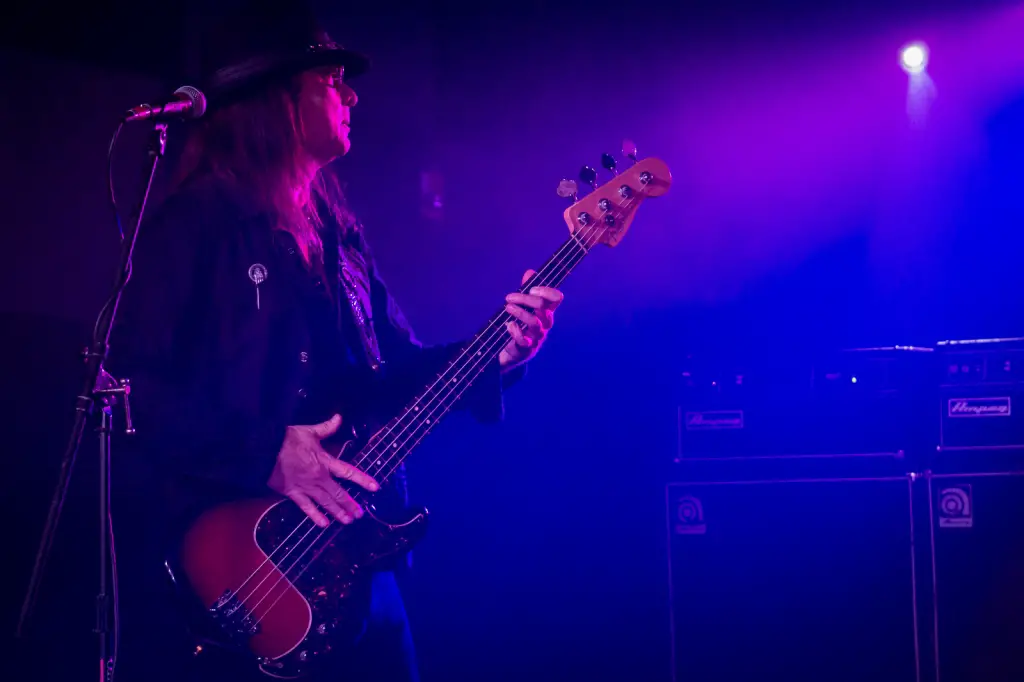
Interested in learning more about the work of Chuck Wright? Check out the links below:
Dig this interview? Check out the full catalog of VWMusic Interviews, by Andrew Daly, here: www.vinylwritermusic.com/interviews
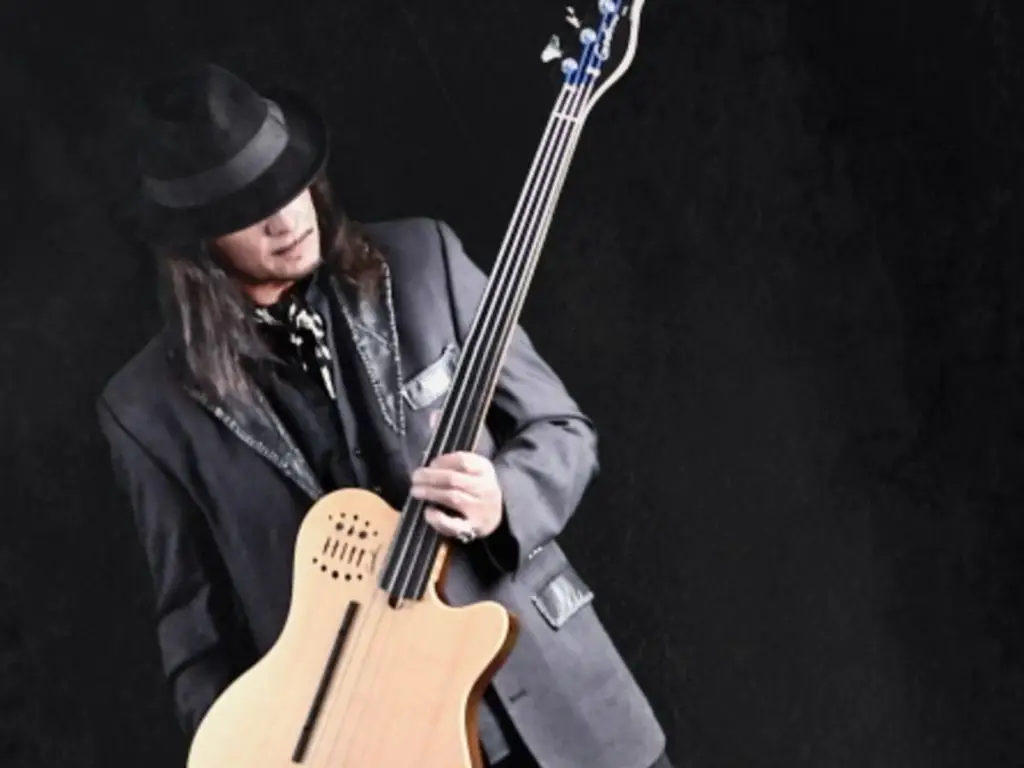




Leave a Reply